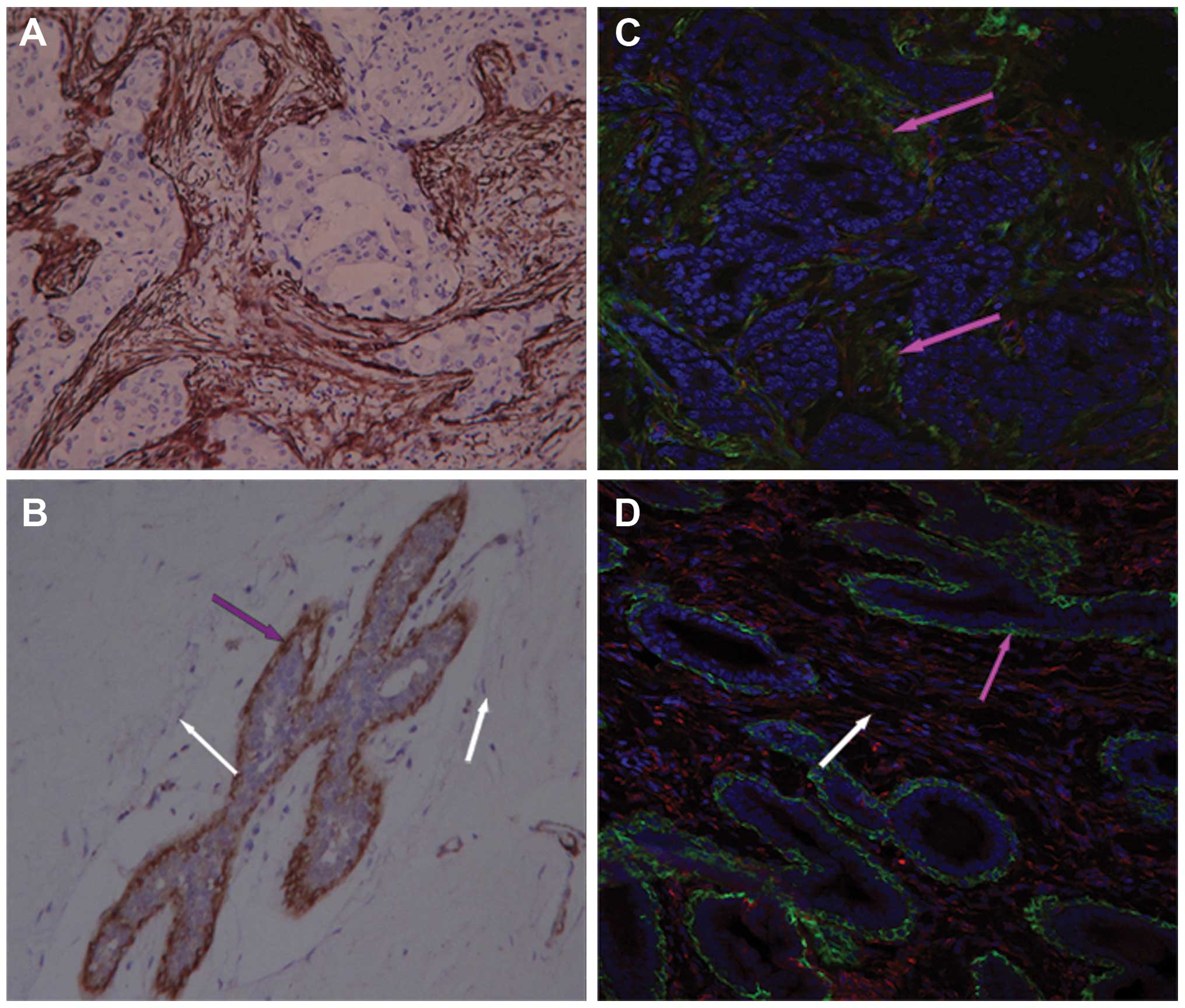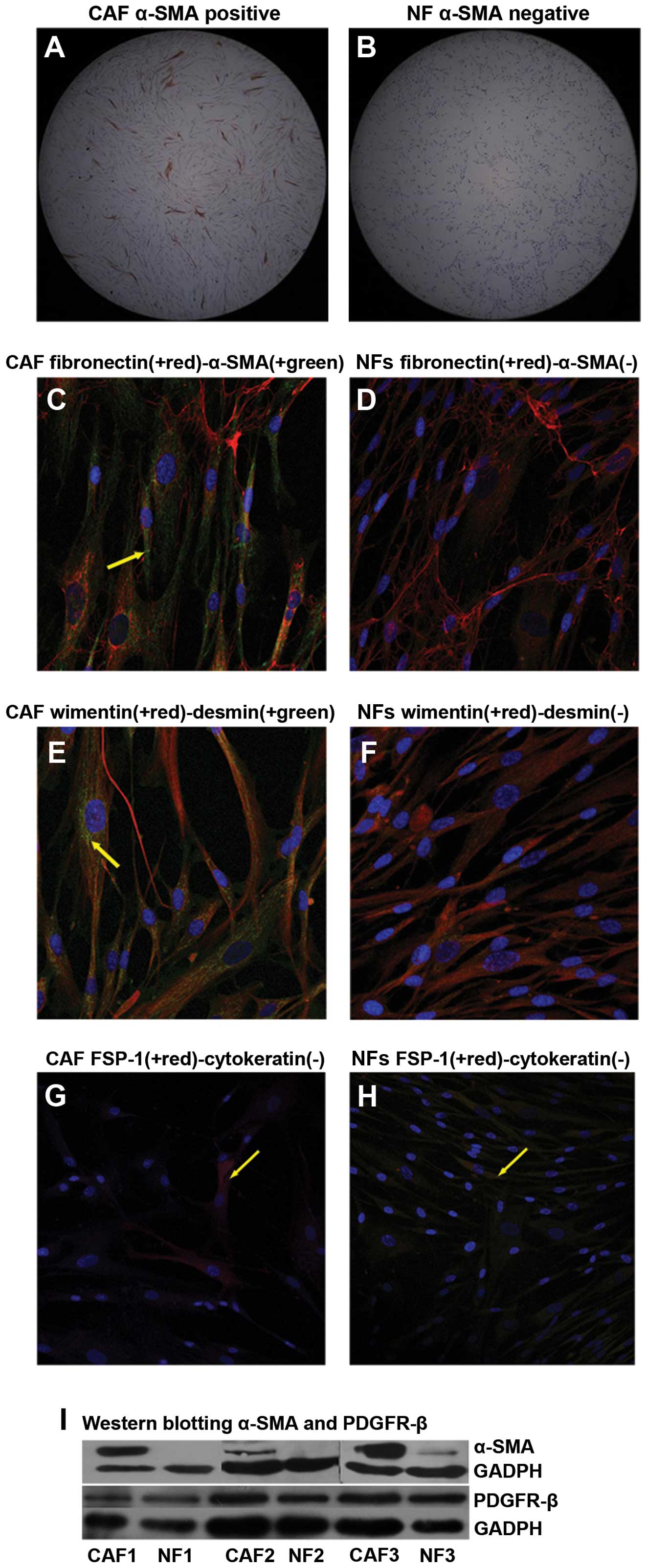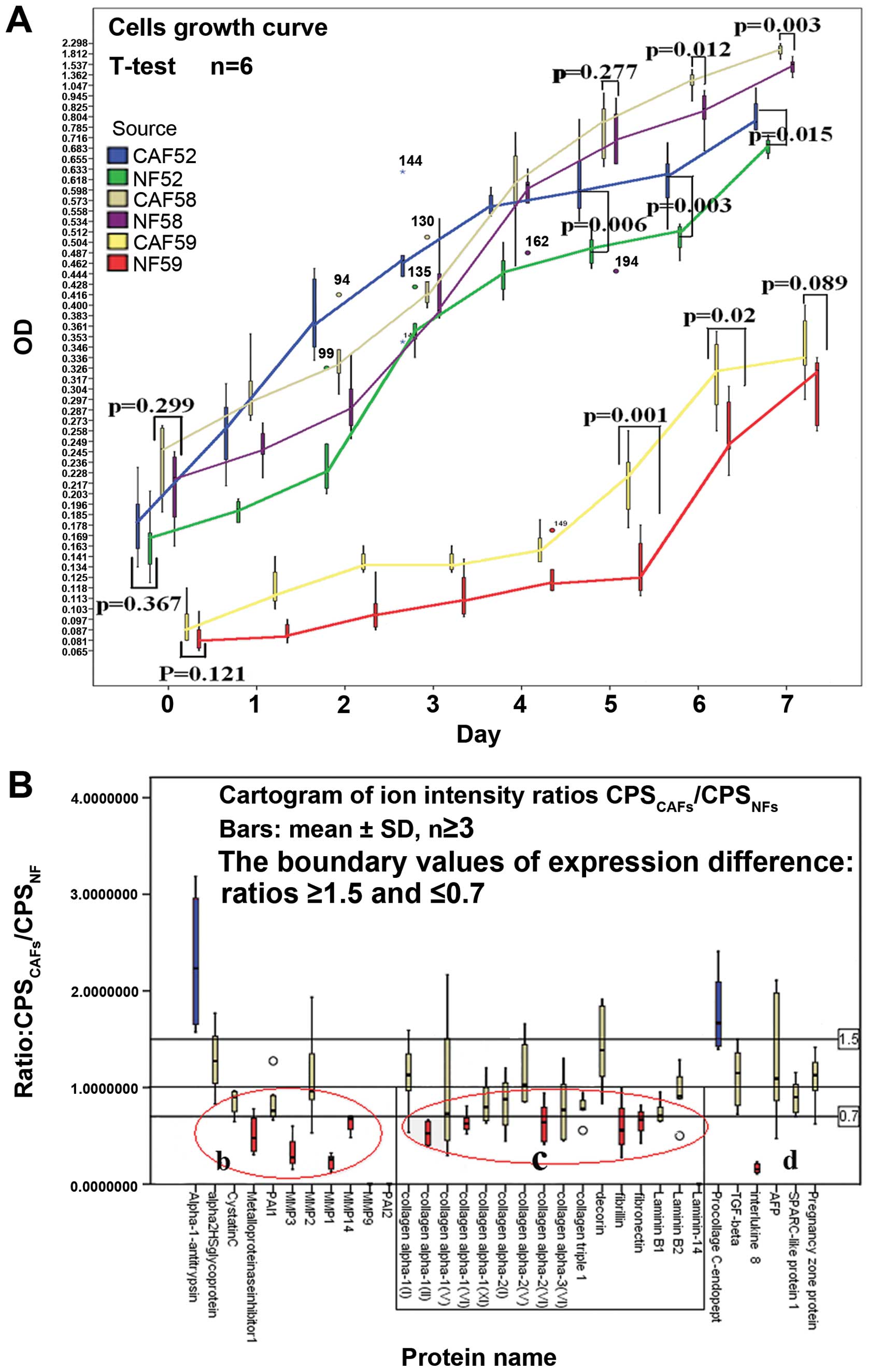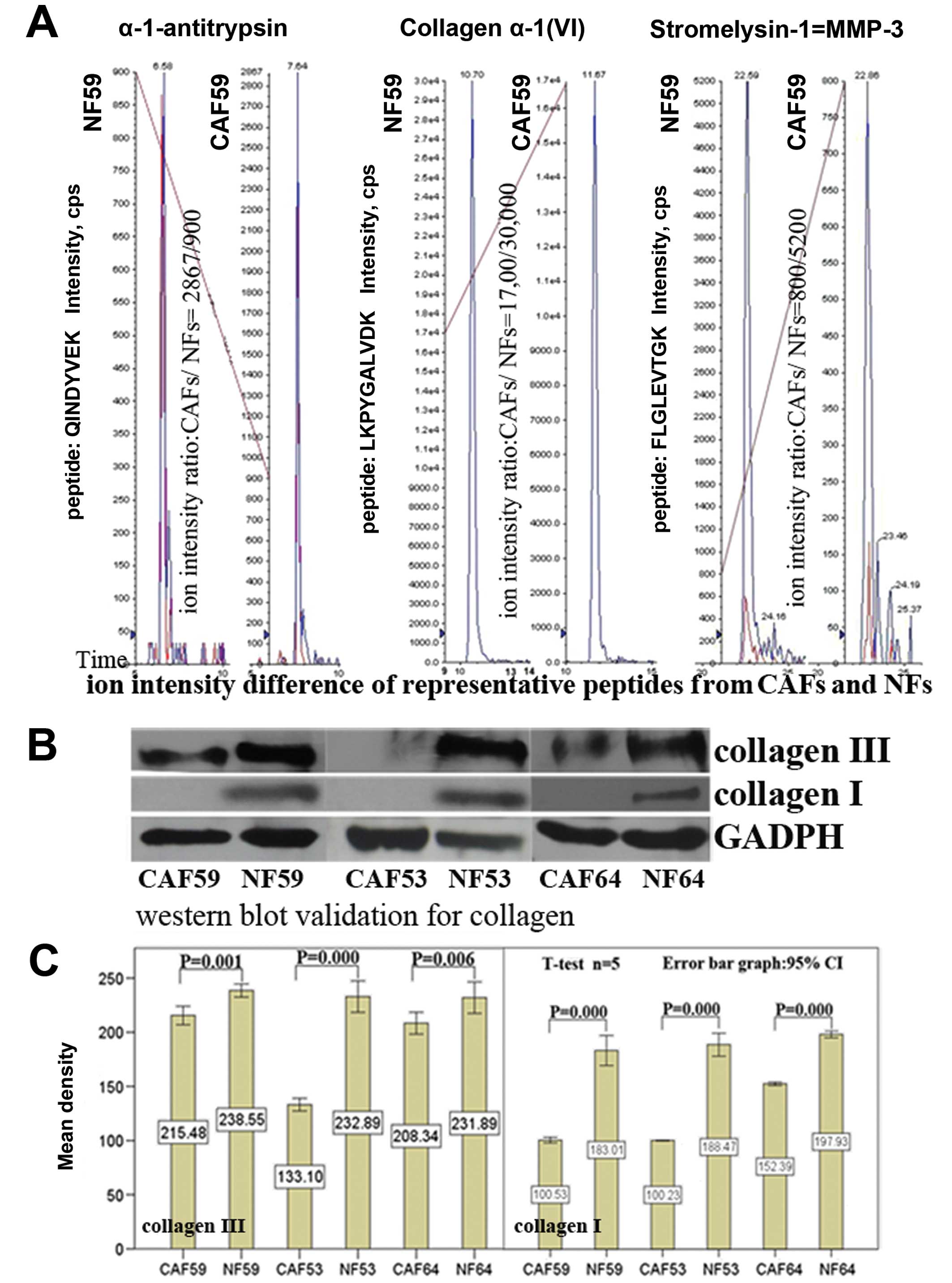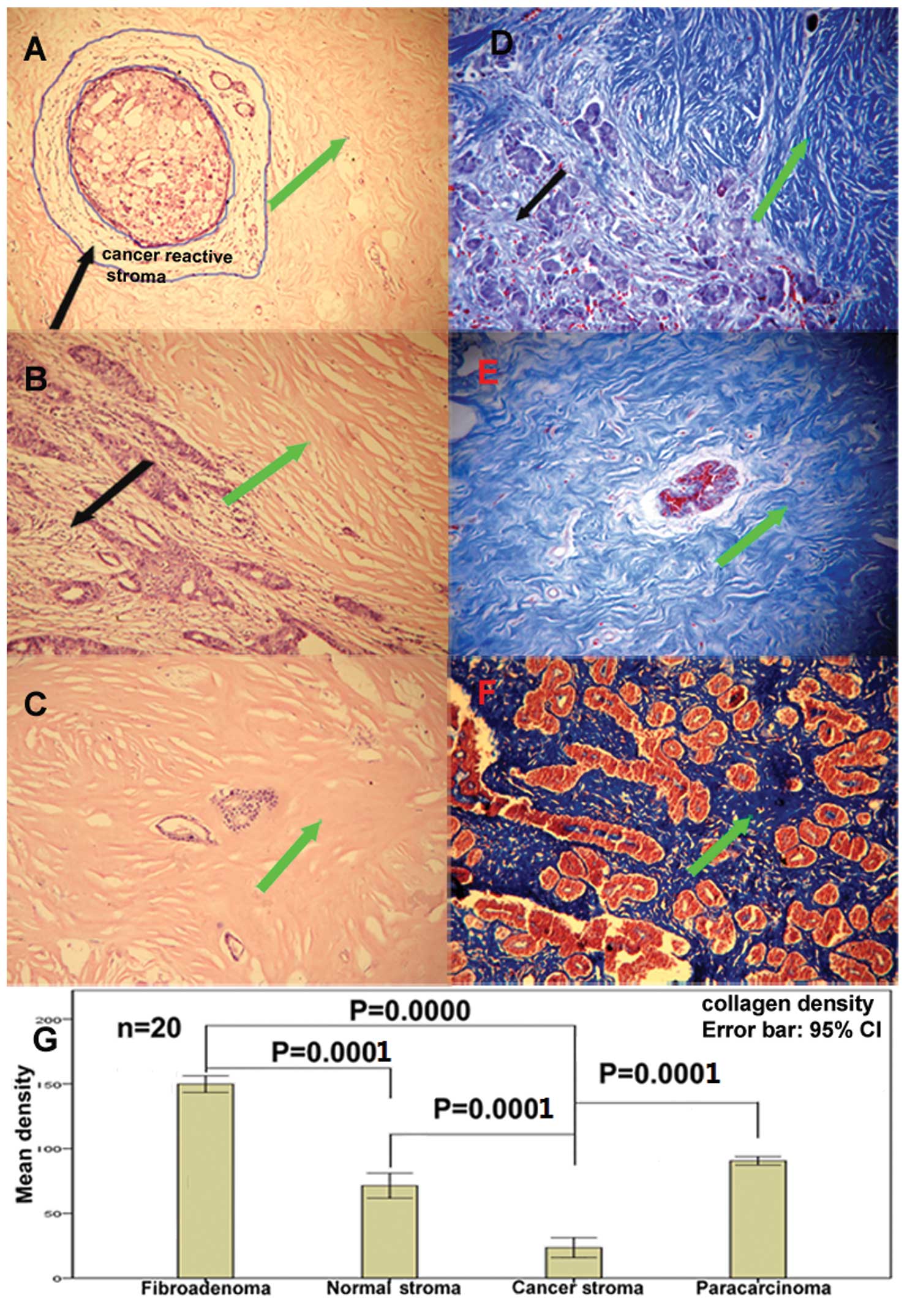|
1
|
Zeisberg M, Strutz F and Muller GA: Role
of fibroblast activation in inducing interstitial fibrosis. J
Nephrol. 13(Suppl 3): S111–S120. 2000.PubMed/NCBI
|
|
2
|
Darby IA and Hewitson TD: Fibroblast
differentiation in wound healing and fibrosis. Int Rev Cytol.
257:143–179. 2007. View Article : Google Scholar : PubMed/NCBI
|
|
3
|
Ryan GB, Cliff WJ, Gabbiani G, Irle C,
Statkov PR and Majno G: Myofibroblasts in an avascular fibrous
tissue. Lab Invest. 29:197–206. 1973.PubMed/NCBI
|
|
4
|
Ryan GB, Cliff WJ, Gabbiani G, et al:
Myofibroblasts in human granulation tissue. Hum Pathol. 5:55–67.
1974. View Article : Google Scholar
|
|
5
|
Watts GT: Myofibroblasts. Lancet.
1:3351979. View Article : Google Scholar
|
|
6
|
Ratajska A and Gawlik Z: Morphological and
physiological characteristics of myofibroblasts. Patol Pol.
33:1–19. 1982.(In Polish).
|
|
7
|
Lorusso G and Ruegg C: The tumor
microenvironment and its contribution to tumor evolution toward
metastasis. Histochem Cell Biol. 130:1091–1103. 2008. View Article : Google Scholar : PubMed/NCBI
|
|
8
|
Tyan SW, Kuo WH, Huang CK, et al: Breast
cancer cells induce cancer-associated fibroblasts to secrete
hepatocyte growth factor to enhance breast tumorigenesis. PLoS One.
6:e153132011. View Article : Google Scholar
|
|
9
|
Pietras K and Ostman A: Hallmarks of
cancer: interactions with the tumor stroma. Exp Cell Res.
316:1324–1331. 2010. View Article : Google Scholar : PubMed/NCBI
|
|
10
|
Bissell MJ and Hines WC: Why don’t we get
more cancer? A proposed role of the microenvironment in restraining
cancer progression. Nat Med. 17:320–329. 2011.
|
|
11
|
Dvorak HF: Tumors: wounds that do not
heal. Similarities between tumor stroma generation and wound
healing. N Engl J Med. 315:1650–1659. 1986. View Article : Google Scholar : PubMed/NCBI
|
|
12
|
Vaheri A, Enzerink A, Rasanen K and
Salmenpera P: Nemosis, a novel way of fibroblast activation, in
inflammation and cancer. Exp Cell Res. 315:1633–1638. 2009.
View Article : Google Scholar : PubMed/NCBI
|
|
13
|
Rasanen K and Vaheri A: Activation of
fibroblasts in cancer stroma. Exp Cell Res. 316:2713–2722. 2010.
View Article : Google Scholar : PubMed/NCBI
|
|
14
|
Gialeli C, Nikitovic D, Kletsas D,
Theocharis AD, Tzanakakis GN and Karamanos NK: PDGF/PDGFR signaling
and targeting in cancer growth and progression: Focus on tumor
microenvironment and cancer-associated fibroblasts. Curr Pharm Des.
20:2843–2848. 2014. View Article : Google Scholar : PubMed/NCBI
|
|
15
|
Bedekovics J, Kiss A, Beke L, Karolyi K
and Mehes G: Platelet derived growth factor receptor-beta
(PDGFRbeta) expression is limited to activated stromal cells in the
bone marrow and shows a strong correlation with the grade of
myelofibrosis. Virchows Arch. 463:57–65. 2013. View Article : Google Scholar
|
|
16
|
Jacob M, Chang L and Pure E: Fibroblast
activation protein in remodeling tissues. Curr Mol Med.
12:1220–1243. 2012. View Article : Google Scholar
|
|
17
|
Liao D, Luo Y, Markowitz D, Xiang R and
Reisfeld RA: Cancer associated fibroblasts promote tumor growth and
metastasis by modulating the tumor immune microenvironment in a 4T1
murine breast cancer model. PLoS One. 4:e79652009. View Article : Google Scholar : PubMed/NCBI
|
|
18
|
Eyden B: The myofibroblast: an assessment
of controversial issues and a definition useful in diagnosis and
research. Ultrastruct Pathol. 25:39–50. 2001. View Article : Google Scholar : PubMed/NCBI
|
|
19
|
Conti JA, Kendall TJ, Bateman A, et al:
The desmoplastic reaction surrounding hepatic colorectal
adenocarcinoma metastases aids tumor growth and survival via
alphav integrin ligation. Clin Cancer Res. 14:6405–6413.
2008. View Article : Google Scholar
|
|
20
|
Schedin P and Keely PJ: Mammary gland ECM
remodeling, stiffness, and mechanosignaling in normal development
and tumor progression. Cold Spring Harb Perspect Biol.
3:a0032282011. View Article : Google Scholar : PubMed/NCBI
|
|
21
|
Barsky SH and Gopalakrishna R: An
experimental model for studying the desmoplastic response to tumor
invasion. Cancer Lett. 35:271–279. 1987. View Article : Google Scholar : PubMed/NCBI
|
|
22
|
Pandol S, Edderkaoui M, Gukovsky I, Lugea
A and Gukovskaya A: Desmoplasia of pancreatic ductal
adenocarcinoma. Clin Gastroenterol Hepatol. 7:S44–S47. 2009.
View Article : Google Scholar : PubMed/NCBI
|
|
23
|
Walker RA: The complexities of breast
cancer desmoplasia. Breast Cancer Res. 3:143–145. 2001. View Article : Google Scholar : PubMed/NCBI
|
|
24
|
Katikireddy KR and O’Sullivan F:
Immunohistochemical and immunofluorescence procedures for protein
analysis. Methods Mol Biol. 784:155–167. 2011. View Article : Google Scholar : PubMed/NCBI
|
|
25
|
Lai TC, Chou HC, Chen YW, et al:
Secretomic and proteomic analysis of potential breast cancer
markers by two-dimensional differential gel electrophoresis. J
Proteome Res. 9:1302–1322. 2010. View Article : Google Scholar : PubMed/NCBI
|
|
26
|
Bluemlein K and Ralser M: Monitoring
protein expression in whole-cell extracts by targeted label- and
standard-free LC-MS/MS. Nat Protoc. 6:859–869. 2011. View Article : Google Scholar : PubMed/NCBI
|
|
27
|
Gudjonsson T, Adriance MC, Sternlicht MD,
Petersen OW and Bissell MJ: Myoepithelial cells: their origin and
function in breast morphogenesis and neoplasia. J Mammary Gland
Biol Neoplasia. 10:261–272. 2005. View Article : Google Scholar : PubMed/NCBI
|
|
28
|
Grinnell F: Fibroblasts, myofibroblasts,
and wound contraction. J Cell Biol. 124:401–404. 1994. View Article : Google Scholar : PubMed/NCBI
|
|
29
|
McAnulty RJ: Fibroblasts and
myofibroblasts: their source, function and role in disease. Int J
Biochem Cell Biol. 39:666–671. 2007.PubMed/NCBI
|
|
30
|
Tettamanti G, Grimaldi A, Rinaldi L, et
al: The multifunctional role of fibroblasts during wound healing in
Hirudo medicinalis (Annelida, Hirudinea). Biol Cell.
96:443–455. 2004. View Article : Google Scholar : PubMed/NCBI
|
|
31
|
Giannoni E, Bianchini F, Masieri L, et al:
Reciprocal activation of prostate cancer cells and
cancer-associated fibroblasts stimulates epithelial-mesenchymal
transition and cancer stemness. Cancer Res. 70:6945–6956. 2010.
View Article : Google Scholar
|
|
32
|
Brentnall TA, Lai LA, Coleman J, Bronner
MP, Pan S and Chen R: Arousal of cancer-associated stroma:
overexpression of palladin activates fibroblasts to promote tumor
invasion. PLoS One. 7:e302192012. View Article : Google Scholar : PubMed/NCBI
|
|
33
|
Sappino AP, Skalli O, Jackson B, Schurch W
and Gabbiani G: Smooth-muscle differentiation in stromal cells of
malignant and non-malignant breast tissues. Int J Cancer.
41:707–712. 1988. View Article : Google Scholar : PubMed/NCBI
|
|
34
|
Heneghan HM, Martin ST, Casey M, Tobbia I,
Benani F and Barry KM: A diagnostic dilemma in breast pathology -
benign fibroadenoma with multinucleated stromal giant cells. Diagn
Pathol. 3:332008. View Article : Google Scholar : PubMed/NCBI
|
|
35
|
Shao ZM, Nguyen M and Barsky SH: Human
breast carcinoma desmoplasia is PDGF initiated. Oncogene.
19:4337–4345. 2000. View Article : Google Scholar : PubMed/NCBI
|
|
36
|
Iacobuzio-Donahue CA, Argani P, Hempen PM,
Jones J and Kern SE: The desmoplastic response to infiltrating
breast carcinoma: gene expression at the site of primary invasion
and implications for comparisons between tumor types. Cancer Res.
62:5351–5357. 2002.PubMed/NCBI
|















